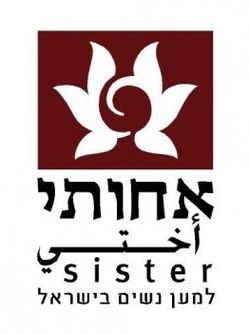Ahoti – for Women in Israel facts for kids
 |
|
| Formation | 2000 |
|---|---|
| Founder | Vicki Shiran, Shula Keshet, Henriette Dahan Kalev, Neta Amar, et al |
| Founded at | Tel Aviv |
| Type | Mizrahi feminist & social justice |
|
Executive Director
|
Shula Keshet |
| Website | Achoti.com |
Ahoti – for Women in Israel (in Hebrew: אחותי – למען נשים בישראל) is a special group that works for fairness and equality. It was started by women who believe in Mizrahi feminism. This means they focus on the unique challenges faced by women from Mizrahi backgrounds in Israel. Ahoti helps women gain power and supports those from lower-income families. They work for justice in money matters, society, and culture.
Contents
History of Ahoti
How Ahoti Started
Ahoti was officially created in 2000. It was founded by a group of Mizrahi feminist activists. These included Henriette Dahan Kalev, Vicki Shiran, Neta Amar, and Shula Keshet. Shula Keshet is still the main leader of the group today.
The group started because they felt that other women's organizations in Israel mostly focused on the needs of Ashkenazi women. These women were often from middle or upper-class families and lived in the center of the country. Ahoti believed that while those issues were important, they didn't cover the struggles of many other women. Many women were fighting just to get by each day.
Books and Projects
In 2007, Ahoti published a book called To My Sister, Mizrahi Feminist Politics. This book is a collection of stories, poems, and articles. They all talk about Mizrahi feminism and topics like social class, identity, and memories.
In 2012, Ahoti released another book, From A to Z: A Dictionary of Peace by Women in Israel. This book was the result of a three-year project. Sixty Jewish Israeli and Arab women shared their ideas about peace. The book includes both stories and poems. It was translated into Hebrew and Arabic so more people could read it.
Important Campaigns
Ahoti has been involved in many important fights for justice. In 2003, they supported Vicki Knafo and single mothers. These mothers were protesting against cuts in money given to families with children.
In 2008, Ahoti helped fight against schools that separated students by their family background in Immanuel. They worked with another group to sue on behalf of parents. They argued that separating students was against the law. They also protested outside the Ministry of Education.
In 2014, Ahoti started the "Mizrahi Feminist Madrasa". This is an educational program that offers courses and workshops. It helps women learn and grow.
Ahoti is also part of the Shutfut Coalition. This is a group of women's organizations that work together. They try to make laws and policies fairer for women.
Fair Trade Shop
In 2009, Ahoti opened the Ahoti Fair Trade shop. This was the first and only shop of its kind in the Middle East. The store works with 16 social groups from all over Israel. It helps women earn fair wages for their work.
The shop sells handmade items from over 200 different artists. These artists come from many different cultural groups. All the products are made by women who need financial support. The shop helps these women sell their products without extra costs from middlemen or advertising.
Ahoti House Community Center
Ahoti's main office is in the south Tel Aviv neighborhood of Neve Sha'anan. This place is called Ahoti House. It is a cultural and community center for Mizrahi feminism.
Ahoti House has an information center and offers advice on many topics. It also hosts art shows, talks, workshops, and other events. These events are for people living in the neighborhood and the wider public.
Black Night Festival
Ahoti House hosts the yearly "Black Night" festival. This festival is a protest against the Tel Aviv city "White Night" festival. Ahoti and other groups from south Tel Aviv say that the city focuses too much on the wealthier, Ashkenazi neighborhoods. They feel that their neighborhoods, which are mostly Mizrahi and also home to many Black communities, are neglected. These areas face challenges like pollution and other social issues. "Black Night" events highlight these problems and celebrate the culture of south Tel Aviv.
Ahoti Leadership
The famous actor and director Ronit Alkabetz was the president of Ahoti until she passed away in 2016. Shula Keshet is the current executive director. Oshri Hayon is the chairwoman of the executive committee. Carmen Elmakias leads the projects. Other important members have included Smadar Lavie, Flora Sasson, Esther Eillam, Henriette Dahan Kalev, and Pnina Motzafi-Haller.

